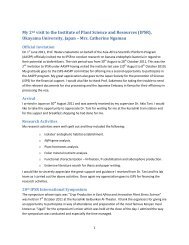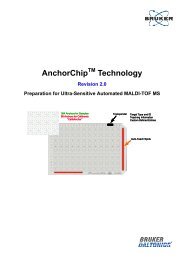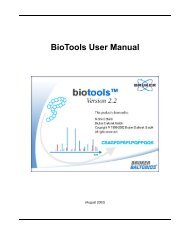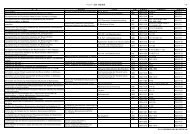Institute of Plant Science and Resources
Institute of Plant Science and Resources
Institute of Plant Science and Resources
You also want an ePaper? Increase the reach of your titles
YUMPU automatically turns print PDFs into web optimized ePapers that Google loves.
Genetic <strong>Resources</strong> Unit<br />
Group <strong>of</strong> Wild <strong>Plant</strong> <strong>Science</strong><br />
Associate Pr<strong>of</strong>essor Takashi Enomoto<br />
Associate Pr<strong>of</strong>essor Shoji Sonoda<br />
Assistant Pr<strong>of</strong>essor Jun Yamashita<br />
Since the foundation <strong>of</strong> our <strong>Institute</strong>, our laboratory has been collecting seeds <strong>of</strong><br />
wild plants from all over Japan <strong>and</strong> Southeast Asia <strong>and</strong> preserving them with their<br />
voucher specimens. We have collected 29,792 seed accessions <strong>of</strong> 5,125 species <strong>of</strong> wild<br />
plants. Among them, 16,566 accessions <strong>of</strong> 3,782 species have been preserved in frozen<br />
storage. Our seed bank contains almost all the weed species <strong>of</strong> Japan, as well as many salt<br />
plants, water plants, <strong>and</strong> endangered plants. All data on the seed accessions <strong>and</strong> their<br />
vouchers have been deposited in the database with photographic files <strong>of</strong> the seeds. We<br />
hope to exchange the deposited seeds upon request for pursuit <strong>of</strong> joint studies. A seedimage<br />
database <strong>of</strong> naturalized alien plants in Japan is available on the WEB<br />
(http://www.rib.okayama-u.ac.jp/wild/okayama_kika_v2/ Seed-image-database.html). It<br />
is a leading world center among seed-image databases that enable users to search the<br />
seeds using morphological characters. We have also been studying molecular phylogeny<br />
<strong>of</strong> vascular plants—mainly monocotyledons. The voucher specimens <strong>of</strong> seed collections,<br />
DNA analyses, <strong>and</strong> geographic distributions <strong>of</strong> plants are preserved in our herbarium.<br />
Intensive use <strong>of</strong> pesticides for pest control has engendered the worldwide emergence<br />
<strong>of</strong> resistant pests. Pesticide resistance is conferred by increased metabolic detoxification<br />
<strong>and</strong> decreased sensitivity <strong>of</strong> the target sites. A more efficient pest management system is<br />
also being developed through analyses <strong>of</strong> fundamental mechanisms <strong>of</strong> pesticide<br />
resistance.<br />
Field surveys in Japan, Korea,<br />
China, Russia, Vietnam, India,<br />
Sri Lanka, Bangradesh, etc.<br />
Seed-Image database <strong>of</strong><br />
naturalized plants in<br />
Japan (English version)<br />
A molecular phylogenetic tree <strong>of</strong><br />
monocotyledons based on DNA<br />
sequences from the plastid matK<br />
<strong>and</strong> rbcL genes (2004)




![[Application Forms to Tenure-track Assistant Professor] Applicants ...](https://img.yumpu.com/36047313/1/184x260/application-forms-to-tenure-track-assistant-professor-applicants-.jpg?quality=85)






